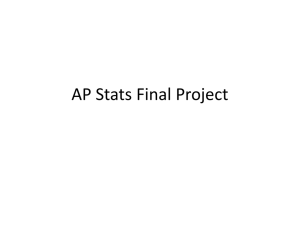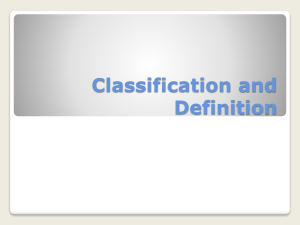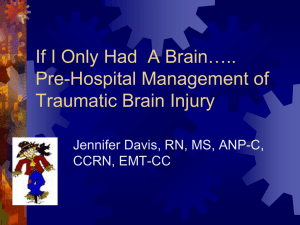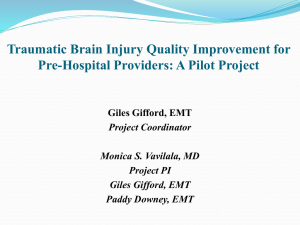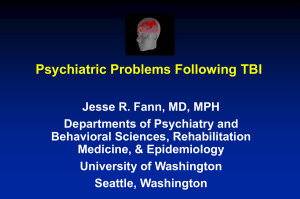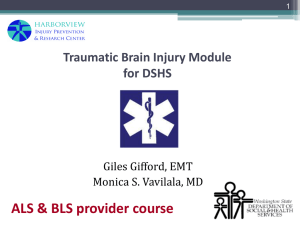PPT
advertisement
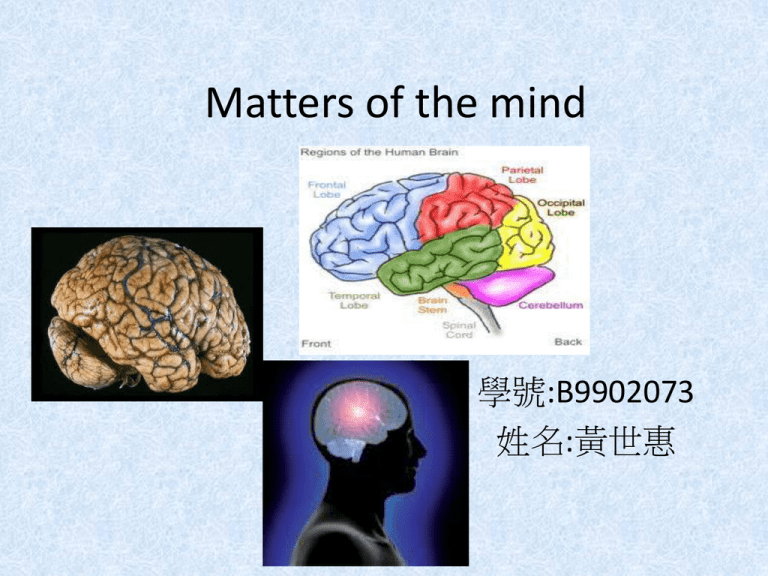
Matters of the mind 學號:B9902073 姓名:黃世惠 Take it easy Brain structure Test your common sense in brain • • • • • • Which area controls our movement? A:cerebellum Which area controls our vision? A: occipital Lobe Which area controls our pulse? A:medulla The reasons cause brain injuries • • • • • • • • Genes Drugs Physical illness Environmental poison injury Food Chemotherapy Aging and so on. Symptoms of brain injuries • • • • • • neurocognitive deficits mental handicap personality changes Coma persistent vegetative state mental handicap and so on • The film depicts 記 憶 拼 圖 paragraph 1 • • • • • Subarachnoid/ˌsəb-ə-ˈrak-ˌnȯid/ 蛛網膜下的 Hemorrhage /ˈhɛmərɪdʒ/出血 Rupture/ˋrʌptʃɚ/破裂 Aneurysm/ˋænjə͵rɪzəm/動脈瘤 Pericallosal胼胝體旁 • summary:F paragraph 2、3 • • • • • • • Ignition/ɪgˋnɪʃən/點火 Vicinity/vəˋsɪnətɪ/近鄰 lock up關起來 Summary:e Misdemeanor/͵mɪsdɪˋminɚ/輕罪 Stereotype/ˋstɛrɪə͵taɪp/使成為陳規 Summary:d paragraph 4 • Clomipramine可洛米普明:it is used in depression andobsessive-compulsive disorder. • Valpromide丙戊醯胺:Medicine of neural disease, it is used in the treatment of epilepsy 癲癇and some affective disorders. It is an anticonvulsant 抗痙攣too. paragraph 4 • Paroxetine帕羅西汀: it is used in treat depression, panic attacks, social anxiety disorder, or premenstrual月經期前dysphoric 煩躁不安 disorder. • Bromazepam博爾靜錠: Medicine of anxiety disorder, insomnolence 失眠, emotion barrier, asthma, stomach ulcer, and duodenal ulcer. • Summary:a paragraph 5 • Lesion/ˋliʒən/損傷 • Relapse/rɪˋlæps/復發 • Wisconsin Card Sorting test:The participant is given a stack of additional cards and asked to match each one to one of the stimulus cards. paragraph 5 • Stroop test:When the name of a color is printed in a color not denoted by the name, naming the color of the word takes longer and is more prone to errors than when the color of the ink matches the name of the color. paragraph 5 • Trail-making The goal of the subject is to finish the test as quickly as possible, and the time taken to complete the test is used as the primary performance metric. • WAIS-R:adult IQ tests paragraph 5 • Semantic/səˋmæntɪk/語義的 • Phonemic/foˋnimɪk/音位的 • SPECT:a nuclear medicine tomographic imaging technique uses gamma rays. it is able to provide true 3D information. • Summary:g paragraph 6 • • • • Detrimental/dɛtrəˋmɛnt!/有害的 Premorbidg生病前 Psychopathy/saɪˋkɑpəθɪ/精神病 Summary:c Main idea • (A) a weird man who stole cars repeatedly. • (B) a man who has some brain damage during an operation leads a totally different life and behave oddly. • (C) Neuropsychological tests fail to find the answer to the weird syndrome. Supporting Information • 1. A normal man began to behave strangely after brain surgery. • 2. He repeatedly stole cars and as a result went to prison. • 3. His motivation wasn’t criminal; he stole cars under effects of alcohol and depression. • 4. His failed to maintain steady employment because of the hemorrhage, and neither medication nor psychotherapy work. • 5. Clinical tests showed nothing unusual except he had slight damage to one part of the brain. • 6. Brain damage may cause dramatic change in a man’s character. Questions for Discussion • How should we treat the person with dramatic character change? • Do people regard brain injury as excuse to avoid their responsibility? How do you face it? • How did the man feel about borrowing other people’s cars? supplementary • • • • Litigation/ˋlɪtəˋgeʃən/訴訟 Neurosis/njʊˋrosɪs/神經症 Manifest/ˋmænə͵fɛst/表明 GCS Glasgow Coma Scale 1 Eyes Verbal Does not open eyes 2 3 Opens eyes in Opens eyes response to in response to painful stimuli voice Makes no Incomprehensible sounds sounds Utters inappropriate words 4 Opens eyes spontaneously Confused, disoriented 5 6 N/A N/A Oriented, converses N/A normally Abnormal Motor Makes no Extension to painful stimuli flexion to painful movements (decerebrate stimuli response) (decorticate response) Flexion / Localizes Withdrawal to painful stimuli painful stimuli Obeys commands supplementary • Generally, brain injury is classified as: Severe, with GCS ≤ 8 Moderate, GCS 9 - 12 Minor/Mild, GCS ≥ 13. • • • • • Amnesia/æmˋniʒɪə/健忘 prognosis /prɑg'nosɪs/ (對病情的)預後 Concussive/kənˋkʌsɪv/震盪性的 Debilitated/dɪˋbɪlə͵tetɪd/操勞過度的 Sequella後遺症 Idea • Because the effects of TBI are unique to the injured individual, it is difficult to compare cases or make generalized assessments about the value of types of TBI claims, making the evaluation of a claim involving mild traumatic brain injury a challenging task for attorneys. Each case will require careful consideration of factors that may affect the ultimate outcome. Supporting Information • Post-concussive syndrome for patients with mild TBI includes physical, cognitive and emotional symptoms which vary greatly for each patient. • No typical pattern showing how the patient is influenced by TBI. • Many factors affect the value of each TBI case. Careful consideration of factors is required. question • Do you think we can accurately differentiate the brain injury by the points in text? • Do we need to tolerant brain injury people if they do the wrong thing?





